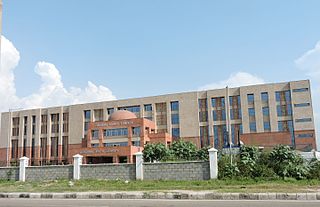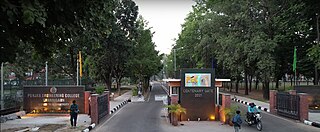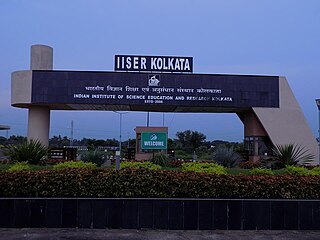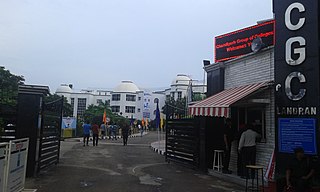
Chandigarh is a union territory and planned city in northern India, serving as the shared capital of the surrounding states, namely Punjab to the north, west and the south, and Haryana to the east. Chandigarh constitutes the bulk of the Chandigarh Capital Region or Greater Chandigarh, which also includes the adjacent satellite cities of Panchkula in Haryana and Mohali in Punjab. It is situated near the foothills of the Himalayas, 260 km north of New Delhi and 229 km southeast of Amritsar.

Panjab University (PU) is an Indian collegiate public state university located in Chandigarh. Funded through both State and Union governments, it is considered a state university. It traces its origins to the University of the Punjab in Lahore, which was founded in 1882. After the partition of India, the university was established on 1 October 1947, and called East Punjab University. Initially housed primarily at a cantonment in Solan, it later relocated to a newly built campus in Chandigarh, and was renamed Panjab University. It is accredited by NAAC at five star level, with the highest NAAC A++ accreditation grade.

Mohali, officially known as Sahibzada Ajit Singh Nagar, is a planned city in the Mohali district in Punjab, India, which is an administrative and a commercial hub lying south-west of Chandigarh. It is the headquarters of the Mohali district and one of the six Municipal Corporations of the State. It is officially named after Sahibzada Ajit Singh, the eldest son of Guru Gobind Singh.

The Indian School of Business (ISB) is a not for profit business school established in India in 2001. It has two parallel campuses in India, in Hyderabad (Telangana) and Mohali (Punjab). It offers certificates in various post-graduate management programs. ISB became the 100th Triple Accredited business school in the world upon achieving AMBA accreditation on 12 May 2020.

Punjab Engineering College is a public research & technical institution in Chandigarh. It was founded in 1921 in Lahore, established in Chandigarh in 1953, and focuses on the field of applied sciences, particularly engineering and technology. It is known for its two-year and four-year programmes for which the entry is through the Joint Entrance Examination – Mains and Graduate Aptitude Test in Engineering. It offers degrees such as Bachelor of Technology, Master of Technology, and a few others. It also has a comprehensive graduate program offering doctoral degrees in Science, Technology, Engineering and Mathematics.

Punjabi University is a collegiate state public university located in Patiala, Punjab, India. It was established on 30 April 1962 and is only the second university in the world to be named after a language, after Hebrew University of Israel. Originally it was conceived as a unitary multi-faculty teaching and research university, primarily meant for the development and enrichment of the Punjabi language and culture, but alive to the social and education requirements of the state.

Indian Institutes of Science Education and Research (IISERs) are a group of prestigious autonomous institutions for teaching and research in natural science established by the Government of India through the Ministry of Education to provide collegiate education in Basic Sciences integrated with research at the undergraduate level. The institutes were formally established by the Parliament of India through the Science Education and Research (Amendment) Act, 2010. Seven IISERs have been established across the country, namely IISER Pune in Maharashtra, IISER Bhopal in Madhya Pradesh, IISER Mohali in Punjab, IISER Kolkata in West Bengal, IISER Thiruvananthapuram in Kerala, IISER Tirupati in Andhra Pradesh, and IISER Berhampur in Odisha. All IISERs were declared as Institutes of National Importance by the Parliament of India in 2012, to promote them as leading institutions in the country in the field of basic sciences along with its sister institutes like Indian Institute of Science, Bangalore. The financial outlay for each IISER is around ₹5 billion (US$63 million) for the first five years of establishment.

Guru Nanak Dev Engineering College is one of the oldest engineering institutions of the northern region situated at Gill Park, Ludhiana, Punjab, India. The foundation stone of the college was laid on 8 April 1956 by Hon'ble Dr. Rajendra Prasad, the first President of India. The college has been named after 1st Sikh Guru Guru Nanak Dev Ji.

Indian Institute of Science Education and Research, Mohali is an autonomous public research university established in 2007 at Mohali, Punjab, India. It is one of the seven Indian Institutes of Science Education and Research (IISERs), established by the Ministry of Human Resources and Development, Government of India, to research in frontier areas of science and to provide science education at the undergraduate and postgraduate level. It was established after IISER Pune and IISER Kolkata and is recognized as an Institute of National Importance by the Government of India. Institute focuses on pure research as well as interdisciplinary research in various fields of science.

Chandigarh Capital Region (CCR) or Chandigarh Metropolitan Region (CMR) is an area, which includes the union territory city of Chandigarh, and its neighboring cities of Mohali, Kharar, Zirakpur, New Chandigarh (in Punjab) and Panchkula, Pinjore, Kalka, Barwala (in Haryana). Chandigarh Administration, Greater Mohali Area Development Authority (GMADA) and Haryana Urban Development Authority (HUDA) are different authorities responsible for development of this region. Baddi, an industrial town in nearby Himachal Pradesh, is also adjacent.

Chitkara University is a private university located in Rajpura, Punjab, India. It offers undergraduate programs, post-graduate program and doctoral programs in fields of engineering, management, pharmacy, health sciences, nursing, hospitality, art & design and education. It was established and is managed by the Chitkara Educational Trust.

Punjab has a long history of education.

The Chandigarh Group of Colleges are the educational institutions located in Mohali district of Punjab in short distance from cities of Chandigarh and Mohali. Chandigarh Group of Colleges was established in 2001 at Landran initially and at Jhanjeri in 2012.

Guru Gobind Singh College of Modern Technology is a private college located at Kharar, Punjab, India. The college curriculum focuses on undergraduate and postgraduate engineering and business management studies. The college is privately supported and is affiliated to the Punjab Technical University, Jalandhar. It is recognized by the All India Council for Technical Education, New Delhi and the government of Punjab. The college is promoted by Shri Guru Gobind Singh Foundation, Mohali.

Army Institute of Law (AIL) is a private law school in Mohali, Punjab, India. The institute is affiliated to Punjabi University, Patiala, and is run by the Army Welfare Education Society (AWES). The institute has a moderately sized campus in Sector 68, Mohali. The hostels can house 400 students.

Chandigarh University (CU) is a private university located in Mohali, India. The university was established on 10 July 2012 by an act of Punjab State Legislature. It is recognized by University Grants Commission under Section 2(f) with the right to confer degrees as per Section 22(1) of the UGC Act, 1956.

Chandigarh Group of Colleges, Jhanjeri, commonly known as CGC Jhanjeri, is a private educational institution in Mohali, Punjab, affiliated with I. K. Gujral Punjab Technical University. It holds the prestigious National Assessment and Accreditation Council (NAAC) A+ accreditation, achieving a noteworthy CGPA of 3.46/4.

















